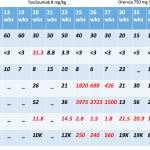Mrs. J was a 31-year-old woman with a five-year history of an overlap syndrome with features of systemic lupus erythematosus and systemic sclerosis. Two months prior to the current admission, she had been hospitalized with altered mental status. At that time, she underwent brain imaging, lumbar puncture, and cerebrospinal fluid analysis and was diagnosed with lupus cerebritis. She was treated with corticosteroids, and her mental status improved to baseline. Her steroid dose was tapered over four weeks without recurrence of altered mental status.
Mrs. J was then admitted to the general medicine service with acute renal failure that was attributed to lupus nephritis. She was started on intravenous methylprenisolone at a dose of 125 mg daily. Over the next three days, she was unable to sleep and developed rapid, pressured speech. Usually mild mannered and cooperative with the nursing staff, she became irritable and suspicious. Psychiatry consultation was requested for assistance in evaluating and managing her acute behavioral changes.
Mrs. J had no previous psychiatric history aside from her recent episode of lupus cerebritis and had not been treated with antipsychotic or antidepressant medications in the past. There was no family history of psychiatric illness or rheumatologic disorders. She was married and lived with her husband and 10-year-old son. She was currently experiencing financial difficulties related to her health problems. She denied any use of alcohol, cigarettes, or illicit drugs, and urine toxicology was negative. She had been following up with her rheumatologist and primary care provider and had been taking medications as prescribed.
Because of the activity of the renal disease, Mrs. J’s rheumatologic condition necessitated continued use of corticosteroids, although the dose of prednisone was tapered to 60 mg daily. At the same time, risperidone was added at a low dose and titrated up to 0.5 mg in the morning and 2 mg at bedtime, with complete resolution of her manic symptoms. Over the next six months, she was able to be tapered off corticosteroids and risperidone without recurrence of the manic symptoms.
The outcome of this case was fortunately favorable, with treatment decisions requiring extensive discussion between the general medicine service and the patient’s consultants, including the rheumatologist, psychiatrist, and nephrologist. As often occurs with lupus patients who develop psychiatric symptoms when treated with glucocorticoids, two major questions arise: Are the psychiatric symptoms from the steroids as opposed to the disease (e.g., cerebritis)? If they are from steroids, how can these symptoms best be treated? This article will provide a framework to decide the answers.

